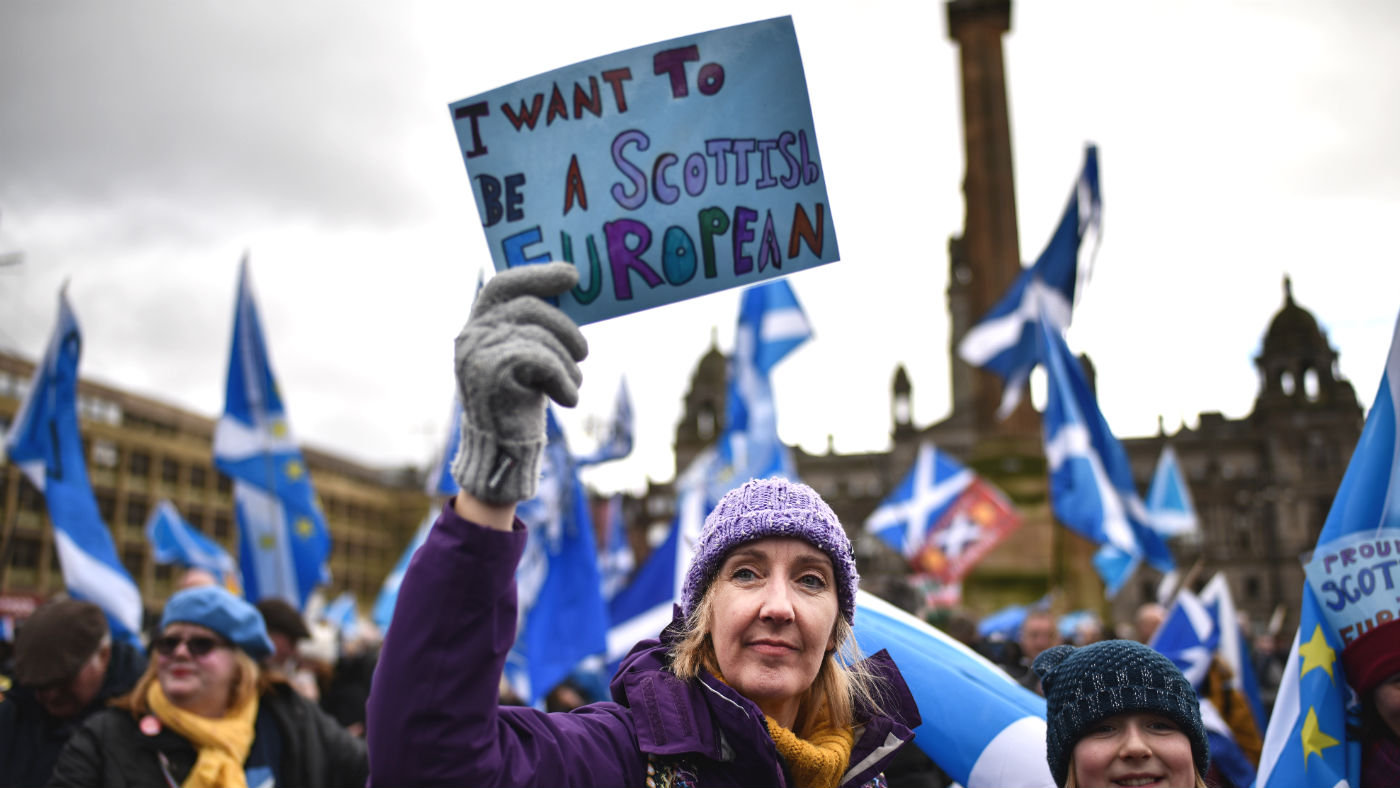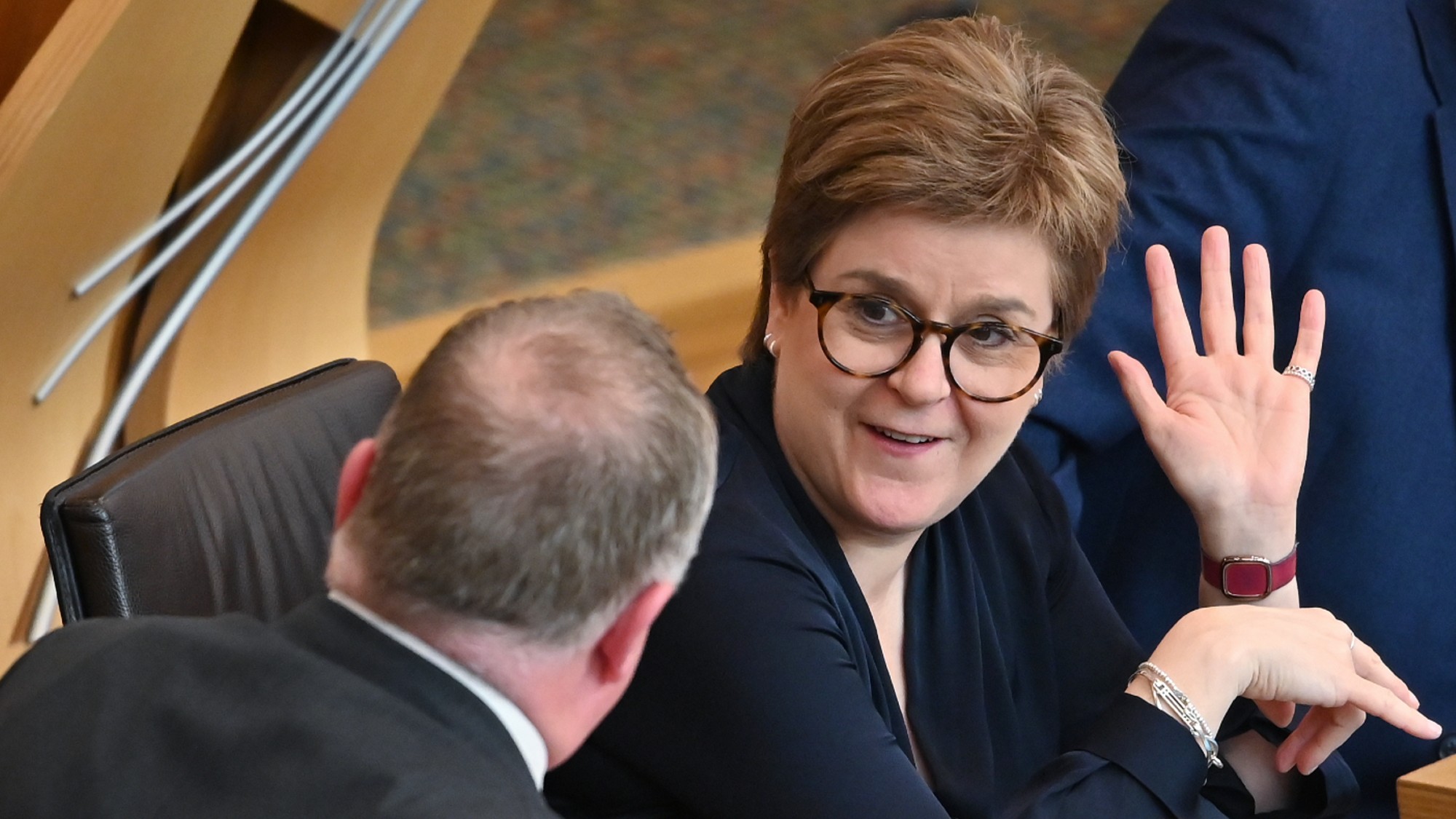Scottish independence: new poll reveals majority now in favour of quitting UK
Calls growing for IndyRef2 as no-deal Brexit looms

A free daily email with the biggest news stories of the day – and the best features from TheWeek.com
You are now subscribed
Your newsletter sign-up was successful
A majority of Scots are now in favour of independence amid growing uncertainty over the terms of Britain’s departure from the European Union, a major new survey has found.
In what is the first poll lead for an independent Scotland since March 2017, 46% of 1,019 Scots said they would vote to split from the rest of the UK, with just 43% voting against, Reuters reports. When those who said they did not know or would not vote are excluded, the result is 52% to 48% in favour of independence.
Conservative peer and pollster Lord Ashcroft carried out the survey in the wake of last week’s visit to Scotland by new UK Prime Minister Boris Johnson, who has vowed to lead the UK out of the EU by 31 October with or without a deal.
The Week
Escape your echo chamber. Get the facts behind the news, plus analysis from multiple perspectives.

Sign up for The Week's Free Newsletters
From our morning news briefing to a weekly Good News Newsletter, get the best of The Week delivered directly to your inbox.
From our morning news briefing to a weekly Good News Newsletter, get the best of The Week delivered directly to your inbox.
First Minister Nicola Sturgeon said the “phenomenal” result showed that Scots were unwilling to be “dragged towards a no-deal Brexit”, reports The Times.
“More and more people think it’s time that Scotland took our own decisions and shaped our own future as a fair, prosperous, outward-looking nation,” she said.
PoliticsHome says the poll findings “will be a serious blow” for Scottish Conservatives Ruth Davidson, who has “repeatedly said that there is no real support for a second independence referendum any time soon”.
But what does this mean, and could Scotland leave the UK any time soon?
A free daily email with the biggest news stories of the day – and the best features from TheWeek.com
Haven’t we been here before?
Yes. In 2014, the Scottish people voted 55%-45% to stay part of the EU after a bitterly fought referendum which divided the country. Although the vote prompted an outpouring of emotion on both sides, public opinion ultimately appeared to be swayed by the economic argument against leaving the UK.
Unionists from all parties joined together to warn of the cost to Scotland of going it alone in what some described as a precursor to the doomed “Project Fear” strategy which failed to swing the EU referendum from Remain.
So what has changed?
The first referendum was described as a “once-in-a-generation” vote, but the SNP says the subsequent decision by the UK to leave the EU inexorably altered the terms of the last debate and effectively nullified the result.
The party argues that 62% of Scots voted to stay in the European Union in 2016, a far bigger margin than the 55% who voted to remain part of the UK back in 2014.
“It is arguable that the United Kingdom that Scotland voted to be a part of in 2014 no longer exists,” writes Louis Staples in The Independent. The fact that a majority of Scots face the prospect of being taken out of Europe against their will has only strengthened the case for a second referendum.
Despite unionist hopes that voters would punish Sturgeon for pushing ahead with a second referendum, supporters of independence have been further boosted by the strong showing of the SNP at May’s European parliamentary elections.
“The once frequent assertions by unionist campaign Better Together that the only way to protect Scotland’s EU membership was to reject independence gave Sturgeon leverage to cast herself as a trusted voice on Brexit, while highlighting the benefits of an independent Scotland within the EU,” says Staples.
Speaking before she held talks in Dublin with Taoiseach (Irish Prime Minister) Leo Varadkar, Sturgeon told the BBC the scale of the SNP’s triumph should send a clear signal to parties at Westminster that Scotland had again emphatically rejected Brexit.
“Scotland said no to Brexit in 2016. This result makes clear: we meant it,” she said.
What happens next?
In plans first set out in April, Sturgeon raised the idea of holding a citizen’s assembly on independence to consider what kind of country Scotland should be and help people make an informed choice about the future.
In May, the SNP-led government published its Referendums (Scotland) Bill, which provides a legal framework for the holding of referendums “on any matters within Scotland’s control”. The legislation is expected to be on the statute book by the end of this year.
However, it does not specify the timing of a possible second referendum or the question that would be put to voters, leaving these to be set by secondary regulations.
Under current constitutional arrangements, an independence referendum would need to be authorised by Westminster, in a so-called Section 30 order - something that “Theresa May repeatedly refused to do”, says The National.
Sturgeon has said that “it is essential the UK Government recognises that it would be a democratic outrage if it seeks to block such a referendum – indeed, any such stance would, in my view, prove to be utterly unsustainable”.
Following the European parliamentary elections, the SNP’s leader in the House of Commons, Ian Blackford, told BBC Radio 4’s Today programme that his party’s price for joining an anti-Brexit alliance at Westminster would be the promise of a second independence referendum.
Blackford said the SNP’s performance in the European elections - in which it scored 38% of the vote - made it “crystal clear” that the party was entitled to use the mandate it had won in the 2016 Scottish parliament elections to stage a fresh vote on leaving the UK.
“I simply say to Westminster that you have to respect the sovereignty of the people of Scotland,” he added.
Who would win IndyRef2?
A majority of Scots surveyed for Lord Ashcroft’s new poll said that if a second independence referendum were held, they believed that Scotland would become independent, with only three in ten saying they thought the nation would vote to remain.
The poll also revealed that 46% of Scots believe that a no-deal Brexit would be “disastrous for Scotland”, and 60% said Brexit made it more likely that Scotland would become independent in the foreseeable future.
But not everyone is convinced. The Ferret fact-checking service has analysed almost 100 other polls involving a total of around 100,000 people since the independence vote in September 2014 in order to assess whether the Scottish electorate’s views have changed.
Although “some political events appear to have shifted public opinion”, there is “little evidence that they have had lasting impact overall”, says the site. The service also found a wide discrepancy in results depending on how the independence question is framed.
-
 How the FCC’s ‘equal time’ rule works
How the FCC’s ‘equal time’ rule worksIn the Spotlight The law is at the heart of the Colbert-CBS conflict
-
 What is the endgame in the DHS shutdown?
What is the endgame in the DHS shutdown?Today’s Big Question Democrats want to rein in ICE’s immigration crackdown
-
 ‘Poor time management isn’t just an inconvenience’
‘Poor time management isn’t just an inconvenience’Instant Opinion Opinion, comment and editorials of the day
-
 How corrupt is the UK?
How corrupt is the UK?The Explainer Decline in standards ‘risks becoming a defining feature of our political culture’ as Britain falls to lowest ever score on global index
-
 The high street: Britain’s next political battleground?
The high street: Britain’s next political battleground?In the Spotlight Mass closure of shops and influx of organised crime are fuelling voter anger, and offer an opening for Reform UK
-
 Biggest political break-ups and make-ups of 2025
Biggest political break-ups and make-ups of 2025The Explainer From Trump and Musk to the UK and the EU, Christmas wouldn’t be Christmas without a round-up of the year’s relationship drama
-
 ‘The menu’s other highlights smack of the surreal’
‘The menu’s other highlights smack of the surreal’Instant Opinion Opinion, comment and editorials of the day
-
 Is a Reform-Tory pact becoming more likely?
Is a Reform-Tory pact becoming more likely?Today’s Big Question Nigel Farage’s party is ahead in the polls but still falls well short of a Commons majority, while Conservatives are still losing MPs to Reform
-
 Taking the low road: why the SNP is still standing strong
Taking the low road: why the SNP is still standing strongTalking Point Party is on track for a fifth consecutive victory in May’s Holyrood election, despite controversies and plummeting support
-
 Is Britain turning into ‘Trump’s America’?
Is Britain turning into ‘Trump’s America’?Today’s Big Question Direction of UK politics reflects influence and funding from across the pond
-
 Nicola Sturgeon's memoir: making the personal political
Nicola Sturgeon's memoir: making the personal politicalTalking Point Former Scottish first minister attempts to set record straight in 'Frankly' but does she leave more questions than answers?